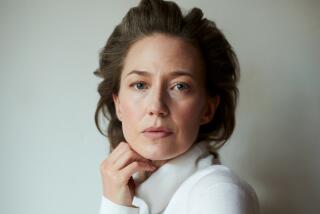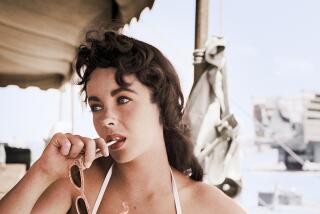How the strong survive
- Share via
When we last saw the Virgin Queen (as incarnated by Cate Blanchett), it was 1558 (in 1998) and she had just completed her transformation from girl monarch to royal icon. The transformation that took place in “Elizabeth” seemed to stem from two wise decisions: remaining unmarried and switching to kabuki makeup. “Elizabeth: The Golden Age” (a title that strikes me as a missed opportunity -- something like “Elizabeth I:II: Caged Heat” would have better captured the essence) gives us the imperious and always majestic Blanchett as the middle-aged queen, last portrayed at that age by Helen Mirren and Judi Dench.
It’s about 30 years later, and she’s hardly aged a day. How does she do it? By sheer force of fantasy, apparently -- the same force that has led director Shekhar Kapur to give us Queen Elizabeth as a cross between Joan of Arc and Joan Crawford, Sir Walter Raleigh as a bodice-ripping pirate sprung from the cover of a supermarket romance novel, King Philip II of Spain as a mincing lulu with a bizarre politico-erotic fixation on the virgin (“Whore!”) queen, and the battle against the Spanish Armada as a series of chopped-together outtakes from “Pirates of the Caribbean.”
It’s 1585, and Elizabeth has ruled for three decades. Mary Stuart of Scotland (Samantha Morton) has her eye on the throne, as does Elizabeth’s brother-in-law King Philip II of Spain (Jordi Molla), who’d like to see England ruled by a Catholic again, and is conspiring with Mary to take over the throne.
Elizabeth’s advisor Francis Walsingham (Geoffrey Rush) is pressuring her to marry -- England needs the money and the military support -- and the realm is crawling with traitors. What’s a girl to do?
Into the scene strides Walter Raleigh (Clive Owen), sex in hose and breeches and fresh from the New World bearing tubers, tobacco and pirated Spanish gold. The queen is amused by his exploits and Raleigh is flattered that she is amused, but that’s as far as the romance goes. Raleigh moves on to unlace the corset of Bess Throckmorton (Abbie Cornish), Elizabeth’s favorite lady-in-waiting. When the queen finds out Bess is pregnant and the couple have secretly married, she banishes Bess and throws Raleigh in prison.
Whatever semblance of restraint Kapur showed in the first movie is flung over an Irish bluff here after Elizabeth slowly evolves into some kind of 16th-century Michael Corleone. The transformation occurs soon after she reluctantly orders her cousin Mary’s execution on Walsingham’s insistence, and gives way to some of the silliest, soapiest bombast to hit the screen since “The Phantom of the Opera.”
“Elizabeth: The Golden Age” gives new meaning to “costume drama” in that it is a drama primarily about costumes. But the drama is about as subtle as a sledgehammer to the temple.
Kapur is so invested in transforming his heroine into a comic book heroine that he reduces her antagonists to caricatures. Mary Tudor is a hysterical, dim-witted turkey; Mary Stuart a twitchy snake; Philip a sweaty creep; his emissaries and soldiers talk like they’re trying not to flunk 7th-grade Spanish. Raleigh, meanwhile, is presented as a Byronic love guru, spouting homilies (“Why be afraid of tomorrow when today is all we have?”) at every opportunity. Not a moment is left un-underscored by a soaring chorale, not a kiss is left un-backgrounded by a smoldering fire, not a pose left unstruck aboard a flaming vessel in the heat of battle.
Elizabeth’s decision not to marry allowed her to retain control of England -- had she married, this power would have transferred to her husband, along with the fate of her Protestant subjects and her father’s money. But this being 2007, we’re invited to reconsider the queen as Sad Career Lady.
After her wax likeness is installed at Madame Tussauds’ (I didn’t know what else to make of the scene in which she stands stock-still, hands outstretched, slowly turning on a Lazy Susan), she visits her former lady-in-waiting and her unrequited love, now free from prison. Gazing into the eyes of their baby, she muses, “I am called the Virgin Queen. Unmarried, I have no master. Childless, I am mother to my people. God give me the strength to bear this mighty freedom.” It’s an actual quote, with a slight tweak. That “freedom” used to be “burden.” Best to take it with a grain of salt, though it makes you wonder if the queen herself wouldn’t find the insinuation somewhat medieval.
“Elizabeth: The Golden Age” MPAA rating: PG-13. Running time: 1 hour, 54 minutes. In general release.
More to Read
Only good movies
Get the Indie Focus newsletter, Mark Olsen's weekly guide to the world of cinema.
You may occasionally receive promotional content from the Los Angeles Times.








